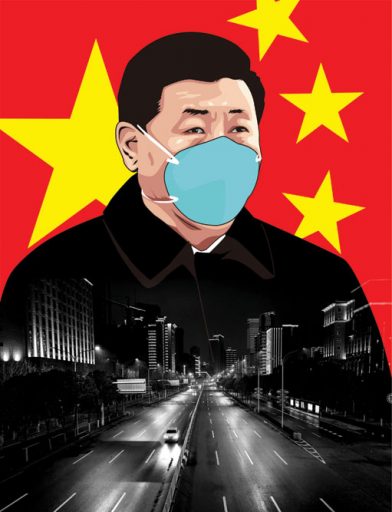Can We Forgive China?
If any other country had sparked such a mammoth international crisis, it would now be in the global doghouse
 Brahma Chellaney
Brahma Chellaney
 Brahma Chellaney
Brahma Chellaney
 |
27 Mar, 2020
|
27 Mar, 2020
/wp-content/uploads/2020/03/China1a.jpg)
(Illustration: Saurabh Singh)
THE INCALCULABLE HUMAN and economic toll exacted by the spread of the novel coronavirus from China promises to shake up global geopolitics, including China’s position in the world. With the 21-day India lockdown—the largest national shutdown in history—nearly half of the global population is now under some form of lockdown, thanks to China’s disastrous, initial missteps that allowed the deadly virus to spread far and wide.
After the global crisis is over, the West’s relationship with China is unlikely to go back to normal. Efforts are expected to begin to loosen China’s grip on global supply chains. Moves are already afoot in the US Congress to bring manufacture of essential medicines back to the US, which currently relies on China for 97 per cent of all its antibiotics.
Asian countries were the first to be affected by the transnational spread of Covid-19 from China. In fact, only after Covid-19 cases with Wuhan links were detected in Thailand and South Korea that China acknowledged its epidemic, when the People’s Daily on January 21st admitted human-to-human spread and publicised Chinese President Xi Jinping’s first comments. The bitterness over China’s role in triggering the pandemic will likely linger in Asia. After all, the lives of many will never be the same.
As US President Donald Trump has said, “the world is paying a big price” for China’s initial, weeks-long cover-up of the Covid-19 outbreak in Wuhan city and other parts of Hubei province. From November 17th onward, according to a South China Morning Post report based on Chinese government data, Wuhan doctors recorded one to five cases daily, before infection rates spiralled and a raging epidemic unfolded. However, China waited until January 21st to issue the first warning to its public. By then, the spread of the virus had gone beyond its control.
A study based on sophisticated modelling has indicated that if Chinese authorities had acted three weeks earlier than they did, the number of Covid-19 cases in China could have been reduced by 95 per cent and the global spread of the disease limited. The virus spread farther and wider because the Communist Party of China (CPC) cared more about its reputation than the Chinese people’s suffering or the transnational impacts.
Make no mistake: China faces lasting damage to its image. The CPC not only engineered the pandemic, however inadvertently, but also has sought to save face by unleashing a sustained disinformation campaign aimed at creating doubts over the new disease’s origin in China. Chinese diplomats, for example, have unabashedly sought to blame the US for the virus. But such outlandish propaganda has few takers.
The images the world has seen of markets in China selling wild animals for slaughter on the spot have served as a reminder of how Beijing ignored warnings from its own experts since the 2002-2003 Severe Acute Respiratory Syndrome (SARS) pandemic, which also originated on Chinese territory. Infectious-disease specialists based in Hong Kong, in a study published in 2007 in an American journal, said the presence of a large reservoir of SARS-like ‘viruses in horseshoe bats, together with the culture of eating exotic mammals,’ was a Chinese ‘time bomb’ that raised the ‘possibility of the reemergence of SARS and other novel viruses from animals or laboratories.’
In fact, just months before the Covid-19 outbreak in China, a biomedical study by four Chinese presciently warned that a new coronavirus will emanate from bats, with ‘an increased probability that this will occur in China.’ The Chinese hunger for the rare, exotic and dubiously curative has fostered wildlife farming, provided a cover for poaching and threatened to drive endangered animals to extinction.

Videos showing Chinese wolfing down pangolins, wolf cubs, dogs, snakes, hedgehogs, civet cats or other animals not only contribute to China’s image problem but also underline the dangers of another deadly disease originating in that country. The CPC wields the big stick to muzzle dissent at home but not to change tastes or attitudes that could give the world yet another pandemic after SARS and Covid-19.
Covid-19, meanwhile, has cast an unflattering light on the only institution tasked with providing global health leadership, the World Health Organization (WHO). Under Tedros Adhanom Ghebreyesus, WHO’s first chief who is not a medical doctor, the institution’s credibility has taken a severe beating.
Tedros, who served as Ethiopia’s health minister and then foreign minister, has mismanaged WHO’s efforts to contain Covid-19, declaring it a pandemic only on March 11th, weeks after the virus had spread across the world. This contrasts with the alacrity with which he has defended China’s Covid-19 response at every stage.
In fact, before China came clean, Tedros actively aided CPC’s efforts to ‘play down the severity, prevalence and scope of the COVID-19 outbreak,’ as two US-based scholars have pointed out. Health officials in Taiwan, which instituted Covid-19 preventive measures before any country, have said that they alerted the WHO on December 31st to human-to-human transmission by detailing how Wuhan medical staff were getting ill. Yet, based on Chinese inputs, the WHO declared on January 14th that there was ‘no clear evidence’ of such transmission. The WHO changed its position only after China belatedly admitted transmission between humans.
When countries like the US, Italy and India banned travel to or from China, Tedros publicly opposed such restrictions on February 4th, warning that they will have “the effect of increasing fear and stigma, with little public-health benefit.” Tedros has further politicised WHO’s role in the current crisis by lavishing praise on Xi, saying he has displayed “a very rare leadership,” and paying tribute to Chinese “transparency,” despite the CPC’s intrinsic aversion to transparency.
Founded 71 years ago, the WHO remains overly bureaucratic and too dependent on some major donors to independently coordinate international health policy, which explains China’s growing sway over that United Nations agency, including shutting the door to Taiwan’s entry. After Tedros’s overt politicisation of international health, the damage to WHO’s credibility will not be easy to repair. Calls are already growing for him to resign.
The lesson from SARS—the first pandemic of the 21st century—was that state transparency and early and accurate public warning are essential to fight the major outbreak of any disease. But Beijing did the opposite during the Covid-19 outbreak, as underscored by a favourite social-media line, ‘China lied and people died.’ Beijing helped spawn a manmade calamity that has created an unparalleled global crisis.
When the outbreak occurred in Wuhan, China acted decisively not against the virus but against the whistle-blowers
In fact, China also covered up the SARS outbreak for more than a month, holding the doctor who blew the whistle on it in military custody for 45 days. And, in the past 19 months, secrecy and under-reporting of African swine flu cases in China has created one of the worst livestock epidemics ever that has killed millions of pigs there. China’s Covid-19 role, however, will rank as the most dangerous cover-up in modern history.
Had Beijing sought to confine the Covid-19 outbreak to its central Hubei province by suspending all travel from there as soon as it became aware of the gravity of the problem, the novel coronavirus might not have spread to other parts of China or to other countries. Instead, it put no restriction on international travel, including from Wuhan, thereby helping to spread the disease internationally.
WHEN COUNTRIES LIKE the US, Italy and India blocked flights to and from China, Beijing expressed dismay, saying such bans went against the WHO recommendation not to restrict travel and trade. ‘In disregard of WHO recommendation against travel restrictions, the US went the opposite way,’ the Chinese foreign ministry’s spokesman said on Twitter in response to America’s January 31st travel restrictions. ‘Where is its empathy?’ Beijing called for lifting the bans, while cajoling small, financially vulnerable countries to keep their borders open to Chinese travellers.
In Italian cities, individual travellers from China held placards at public intersections that read, ‘Please hug me: I am a Chinese, not a virus.’ And videos showing them receiving hugs from passersby were telecast in China by the state media to signal that the world still loved China.
Now, by spreading unfounded conspiracy theories, China is seeking to deflect criticism for its role in starting a pandemic by covering up the coronavirus outbreak at home. Indeed, the Chinese leadership is facing a credibility problem at home over its secretive initial response to the outbreak. It has sought to save itself from the people’s wrath by spreading conspiracy theories on the origin of the virus and by patting itself on the back for supposedly bringing the spread of the disease under control. Xi has been portrayed as a hero who is leading the country to victory in a ‘people’s war’ against Covid-19.
The Covid-19 crisis has not stopped the regime from going after anyone daring to expose its initial cover-up. Beijing property tycoon Ren Zhiqiang, who called Xi a ‘clown-emperor with no clothes,’ has been missing since mid-March. ‘I see not an emperor standing there exhibiting his ‘new clothes,’ but a clown who stripped naked and insisted on continuing to be an emperor,’ Ren had said in an essay that blamed Xi for silencing whistle-blowers and suppressing information on the outbreak.
Many Chinese are still seething over the regime’s initial concealment and mismanagement of the crisis. The public anger at home, coupled with the damage to China’s global image, has prompted Beijing to launch a public-relations blitzkrieg, including churning out conspiracy theories.
As if China’s role in starting a global pandemic was not enough, Beijing is now unleashing a pandemic of lies. To be sure, fabrications and disinformation are integral to China’s ‘three wars’ concept: public opinion warfare, psychological warfare and legal warfare. Consequently, the circulation of disinformation is an old Chinese tactic.
With its ‘three wars’ doctrine, Beijing has sought to send two messages to the rest of the world: ‘we did everything to stop the outbreak; in fact, we bought you time;’ and ‘the virus probably didn’t even originate in China.’ The paradox is that the two messages, built on falsehoods, are contradictory. But that does not bother the regime, which has published a propaganda book in multiple languages, including English, Arabic, Spanish, French and Russian. The book, touting its handling of the disease, is titled, A Battle Against Epidemic: China Combatting COVID-19 in 2020.

China’s combative public diplomacy involves the use of Twitter and other social-media platforms to influence the international narrative through misinformation and disinformation. Zhao Lijian, the new in-charge of the social-media propaganda machine, has recently used Twitter to push unfounded conspiracy theories, including that the novel coronavirus was brought by US Army officers who visited Wuhan in October 2019.
Before becoming the Chinese foreign ministry’s spokesman in Beijing earlier this year, Zhao was China’s deputy chief of mission in Pakistan, where he honed his social-media propaganda skills. In Pakistan, Zhao peddled conspiracy theories on Twitter (which is banned in China) and added ‘Muhammad’ to his name (until Beijing outlawed the use of ‘Muhammad’ and other overtly Islamic names in Xinjiang and elsewhere). His appointment as a foreign ministry spokesman signalled that Beijing was moving from aggressive diplomacy to brazen diplomacy. Zhao’s actions have helped validate that hypothesis.
More broadly, China is now seeking to aggressively rebrand itself as the global leader in combating a virus that spread internationally from its own territory. Its rebranding effort includes counter-pandemic aid to developing countries, a pledge to donate $20 million to the WHO and a massive PR campaign, which extends from a claim to have fully contained the coronavirus in its worst-affected areas to disseminating plain disinformation so as to obscure its disastrous missteps that gifted the world a horrendous pandemic.
With the help of the CPC’s propaganda organs, Beijing is trying to fashion a narrative that China is an example of how to control the spread of Covid-19. In fact, like the arsonist offering to extinguish the fire it started, China is now seeking to help other countries combat a dangerous pathogen after its own gross negligence led to that virus spreading across the globe.
The attempt clearly is to deflect liability for a global crisis whose costs continue to mount. After all, if any other country had sparked such a mammoth international crisis, it would now be in the global doghouse.
Beijing’s proactive attempt to rewrite the history of the pandemic, even as much of the world grapples with its escalating consequences, highlights its well-oiled machine. Yet, when the Covid-19 outbreak occurred in Wuhan, China acted decisively not against the virus but against the whistle-blowing doctors, eight of whom were detained. This underscores that, for the world’s strongest and richest dictatorship, power and control take precedence over everything else, including human lives.
Having spawned the global coronavirus crisis, China is now planning to exploit the financial and other disruptions that the pandemic has engendered. It is hoping to game the situation in order to gain greater technological and industrial advantage. But the international anger over its role in triggering the pandemic could frustrate its plans.
The pandemic’s lesson for many countries is that, in an increasingly interconnected and interdependent world, China’s secrecy and obfuscation are antithetical to globalisation and international security. Transparency is essential to make us all safer. China cannot have its cake and eat it too. It must fundamentally reform and abide by international norms.
If the pandemic upends the world order as we know it, China’s role will be a key trigger.
Click here to read all Coronavirus related articles

/wp-content/uploads/2025/05/Cover-Youth-2025.jpg)












More Columns
Tiger’s World Open
Heroism of the Ordinary Kaveree Bamzai
Mr Bodacious Meets Ms Bossy Pants Kaveree Bamzai